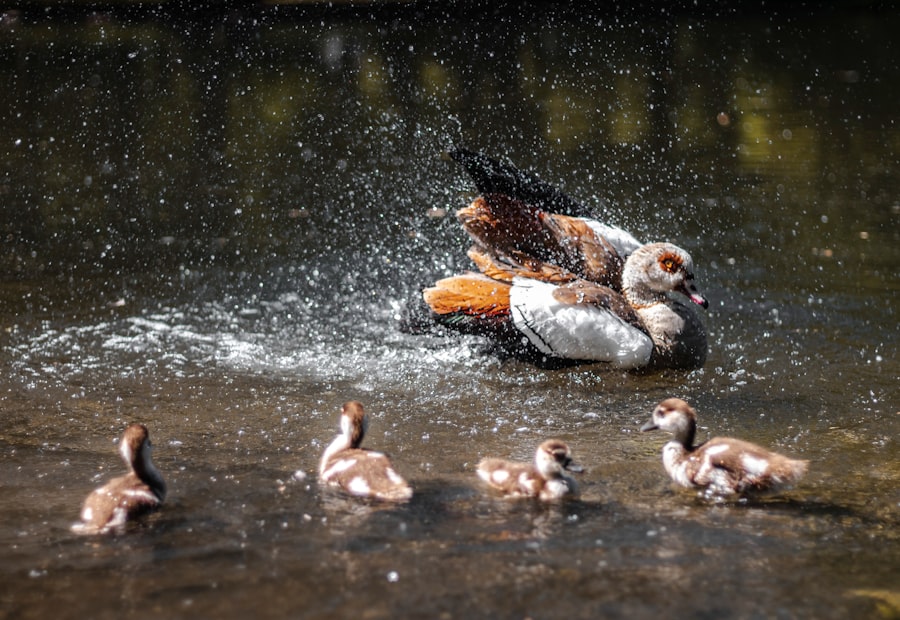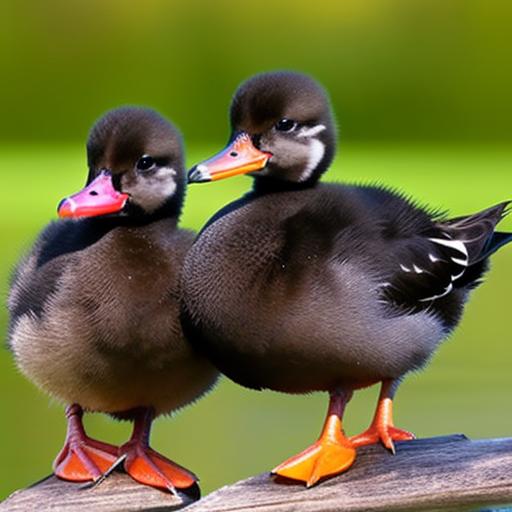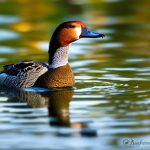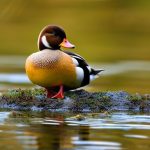Black baby duck breeds are a popular choice among duck enthusiasts for their unique and striking appearance. These ducks have a beautiful black plumage that sets them apart from other duck breeds. They are often sought after for their aesthetic appeal and make great pets for those who appreciate their beauty.
Black baby duck breeds come in various sizes and shapes, but they all share the common characteristic of having black feathers. Some popular black baby duck breeds include the Black Swedish, Cayuga, and Indian Runner ducks. These ducks are not only visually appealing but also have unique personality traits that make them a joy to have as pets.
Key Takeaways
- Black baby duck breeds have a unique and striking appearance that sets them apart from other duck breeds.
- The history of black baby duck breeds dates back to ancient times, with evidence of their existence found in artwork and literature.
- Physical characteristics of black baby duck breeds include a black plumage, orange beak, and webbed feet.
- Popular black baby duck breeds in the United States include the Black Swedish, Cayuga, and Black Runner.
- Black baby ducks are known for their friendly and curious personalities, making them great pets for families.
- Caring for black baby ducklings requires proper nutrition, housing, and socialization.
- Choosing a reputable breeder is important to ensure the health and well-being of black baby ducks.
- Common health issues in black baby duck breeds include respiratory infections and parasites.
- Training and socializing black baby ducks can help them become well-behaved and friendly pets.
- Black baby ducks play an important role in agriculture and conservation efforts, as they can help control pests and maintain wetland ecosystems.
The History of Black Baby Duck Breeds
The origins of black baby duck breeds can be traced back to different parts of the world. The Black Swedish duck, for example, originated in Sweden and was brought to the United States in the late 1800s. It was developed by crossing various Swedish landrace ducks to create a breed with a solid black plumage.
The Cayuga duck, on the other hand, has its origins in North America. It is believed to have been developed from wild black ducks found in the Cayuga Lake region of New York. These ducks were selectively bred for their black plumage and eventually became recognized as a distinct breed.
The Indian Runner duck, although not exclusively black, also comes in a black variety. This breed originated in the East Indies and was brought to Europe in the 19th century. It is known for its upright posture and distinctive running gait.
Physical Characteristics of Black Baby Duck Breeds
Black baby duck breeds have several physical characteristics that set them apart from other duck breeds. One of the most obvious features is their solid black plumage, which gives them a sleek and elegant appearance. Their feathers are usually shiny and reflect light, adding to their overall beauty.
In terms of size, black baby duck breeds can vary. The Black Swedish duck is a medium-sized breed, while the Cayuga duck is slightly larger. The Indian Runner duck, on the other hand, is a smaller breed known for its upright posture and slender body.
Black baby duck breeds also have unique beak and leg colors. The Black Swedish duck has a yellow beak and orange legs, while the Cayuga duck has a black beak and black legs. The Indian Runner duck has a yellow beak and orange legs in its black variety.
Popular Black Baby Duck Breeds in the United States
In the United States, there are several popular black baby duck breeds that are sought after by duck enthusiasts. These breeds include the Black Swedish, Cayuga, and Indian Runner ducks.
The Black Swedish duck is known for its calm and friendly nature, making it a great choice for families with children. It is a medium-sized breed with a solid black plumage and a yellow beak. It is also a good layer of large white eggs.
The Cayuga duck is slightly larger than the Black Swedish duck and has a black beak and black legs. It is known for its docile temperament and excellent foraging abilities. It is also a good layer of dark-colored eggs.
The Indian Runner duck, although not exclusively black, also comes in a black variety. It is known for its upright posture and distinctive running gait. It is an active breed that loves to forage and explore its surroundings.
The Unique Personality Traits of Black Baby Duck Breeds
Black baby duck breeds have unique personality traits that make them stand out from other duck breeds. They are known for their friendly and sociable nature, making them great companions for both adults and children.
Black baby ducks are often described as curious and intelligent. They enjoy exploring their surroundings and are quick to learn new things. They can be easily trained to follow basic commands and can even be taught to perform tricks.
These ducks are also known for their calm and docile temperament. They are not aggressive and get along well with other ducks and animals. They are often seen as the peacemakers in a flock and can help to maintain harmony among other ducks.
Caring for Black Baby Ducklings: Tips and Tricks

Caring for black baby ducklings requires some special considerations to ensure their health and well-being. Here are some tips and tricks for caring for these adorable creatures:
1. Housing: Provide a safe and secure enclosure for your black baby ducklings. Make sure it is predator-proof and has enough space for them to move around comfortably.
2. Heat: Ducklings need to be kept warm, especially during their first few weeks of life. Provide a heat source such as a heat lamp or brooder to maintain a temperature of around 90-95 degrees Fahrenheit.
3. Feeding: Feed your black baby ducklings a balanced diet that includes a commercial duck starter feed. You can also supplement their diet with fresh greens, insects, and small amounts of fruits and vegetables.
4. Water: Ducks need access to clean water at all times. Provide a shallow dish or container that they can easily access without the risk of drowning.
5. Socialization: Spend time with your black baby ducklings to socialize them and build a bond. Handle them gently and introduce them to new experiences gradually.
The Importance of Choosing a Reputable Breeder for Black Baby Ducks
When buying black baby ducks, it is important to choose a reputable breeder to ensure that you are getting healthy and well-cared-for ducks. A reputable breeder will have proper knowledge of breeding practices, provide appropriate care for the ducks, and be transparent about the breed’s history and health.
To find a reputable breeder, do thorough research and ask for recommendations from other duck enthusiasts or local agricultural organizations. Visit the breeder’s facility if possible to see how the ducks are kept and ask questions about their breeding practices.
Avoid buying ducks from pet stores or online marketplaces without proper research. These sources may not provide the necessary information about the ducks’ background or health, and you may end up with ducks that have genetic or health issues.
Common Health Issues in Black Baby Duck Breeds
Like any other animal, black baby duck breeds can be prone to certain health issues. Some common health issues in black baby duck breeds include respiratory infections, parasites, and nutritional deficiencies.
To prevent these health issues, provide a clean and well-ventilated environment for your ducks. Regularly clean their enclosure and provide fresh bedding. Make sure they have access to clean water and a balanced diet that meets their nutritional needs.
If you notice any signs of illness in your black baby ducks, such as coughing, sneezing, or changes in behavior or appetite, consult a veterinarian who specializes in avian medicine. They will be able to diagnose and treat any health issues your ducks may have.
Training and Socializing Black Baby Ducks
Training and socializing black baby ducks is an important part of their care. Here are some tips for training and socializing these ducks:
1. Start early: Begin training and socializing your black baby ducks as soon as you bring them home. The earlier you start, the easier it will be to establish a bond with them.
2. Use positive reinforcement: Reward your ducks with treats or praise when they exhibit desired behaviors. This will encourage them to repeat those behaviors in the future.
3. Be patient: Ducks may take some time to learn new commands or behaviors. Be patient and consistent in your training efforts.
4. Handle them gently: Handle your black baby ducks gently and avoid any rough handling that could cause them stress or injury.
5. Provide socialization opportunities: Introduce your ducks to new experiences and environments gradually. This will help them become more comfortable and confident in different situations.
The Role of Black Baby Ducks in Agriculture and Conservation Efforts
Black baby ducks play an important role in agriculture and conservation efforts. They can be used for pest control, as they have a natural instinct to forage for insects and other small pests. This can help reduce the need for chemical pesticides in agricultural settings.
Black baby ducks also play a role in wetland restoration. Their foraging habits can help control the growth of invasive plant species and promote the growth of native vegetation. They can also help improve water quality by filtering out pollutants and excess nutrients.
In conclusion, black baby duck breeds are unique and fascinating creatures that make great pets and have important roles in agriculture and conservation efforts. By understanding their history, physical characteristics, and unique personality traits, as well as how to care for them and choose a reputable breeder, you can enjoy the company of these wonderful animals for years to come.
If you’re interested in black baby duck breeds, you might also want to check out this informative article on poultrywizard.com about the Producers Pride Sentinel Chicken Coop. This coop is designed to provide a safe and comfortable environment for your ducks, ensuring their well-being and allowing them to thrive. With its sturdy construction and practical features, the Producers Pride Sentinel Chicken Coop is a great option for anyone looking to raise black baby ducks. To learn more about this coop and other helpful tips for keeping chickens, visit poultrywizard.com.
FAQs
What are black baby duck breeds?
Black baby duck breeds are a group of domestic duck breeds that have black feathers as their primary color. These breeds are commonly raised for meat, eggs, and as pets.
What are some examples of black baby duck breeds?
Some examples of black baby duck breeds include the Black Swedish, Cayuga, and Black Indian Runner. Other breeds with black feathers include the Black East Indie, Black Muscovy, and Black Pekin.
What is the size of black baby duck breeds?
The size of black baby duck breeds varies depending on the breed. Some breeds, like the Black Indian Runner, are small and lightweight, while others, like the Muscovy, can be quite large and heavy.
What is the temperament of black baby duck breeds?
The temperament of black baby duck breeds can vary depending on the breed and individual duck. Some breeds, like the Black Indian Runner, are known for being active and curious, while others, like the Muscovy, can be more docile and calm.
What is the lifespan of black baby duck breeds?
The lifespan of black baby duck breeds can vary depending on the breed and individual duck. On average, domestic ducks can live for 5-10 years, but some breeds, like the Muscovy, can live for up to 20 years.
What is the diet of black baby duck breeds?
The diet of black baby duck breeds consists of a mix of commercial duck feed, fresh vegetables, and clean water. Some breeds, like the Muscovy, may also eat insects and small animals. It is important to provide a balanced diet to ensure the health and well-being of the ducks.
Meet Walter, the feathered-friend fanatic of Florida! Nestled in the sunshine state, Walter struts through life with his feathered companions, clucking his way to happiness. With a coop that’s fancier than a five-star hotel, he’s the Don Juan of the chicken world. When he’s not teaching his hens to do the cha-cha, you’ll find him in a heated debate with his prized rooster, Sir Clucks-a-Lot. Walter’s poultry passion is no yolk; he’s the sunny-side-up guy you never knew you needed in your flock of friends!







